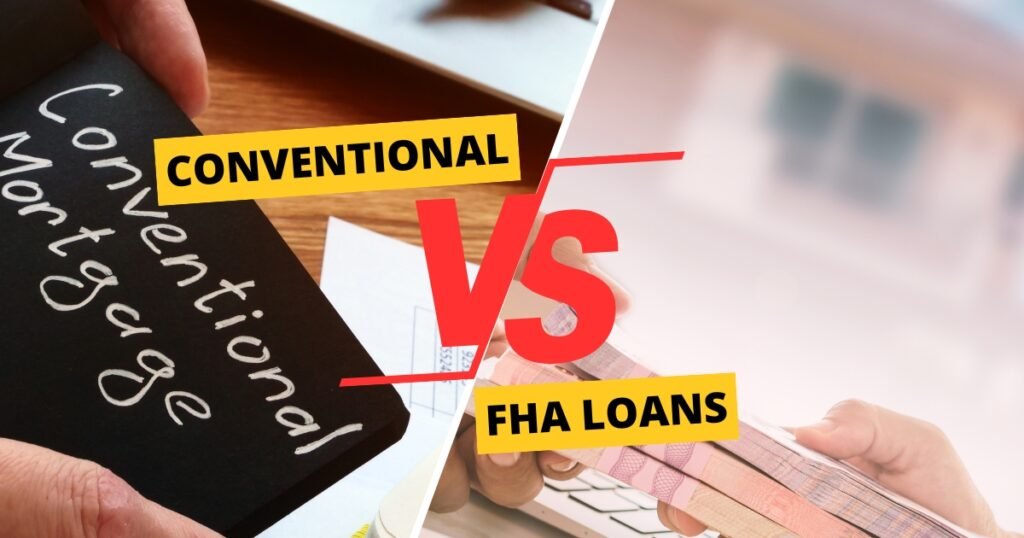When choosing a mortgage, understanding the difference between FHA and conventional loans is essential. FHA loans, backed by the government, offer easier qualifications but often come with higher long-term costs.
On the other hand, conventional loans require stronger credit but save more time. Thus, this comparison helps homebuyers decide which loan best aligns with their financial situation and homeownership goals.
What are FHA and Conventional Loans?
The FHA loan is a type of mortgage insured by the Federal Housing Administration (FHA). It is a part of the U.S. Department of Housing and Urban Development (HUD). It was created to help low-to-moderate-income individuals or first-time homebuyers qualify for home financing. FHA loans require a lower minimum down payment of 3.5% and more flexible credit requirements. Borrowers with credit scores as low as 580 can qualify, although a score below 580 may still be accepted with higher down payment.
On the contrary, a conventional loan is a mortgage not backed by government agencies like the FHA, VA, or USDA. Instead, it is offered through private lenders like banks, credit unions, or mortgage companies, and it can be either conforming or non-conforming. Furthermore, conventional loans require a higher credit score of 620 or above, and the down payment starts at 3%. However, putting down 20% can help avoid private mortgage insurance (PMI).
Credit Score Requirement: How They Differ
The differences between FHA and conventional loans in terms of credit score requirements are:
1. Impact on Interest Rate
- With FHA loans, interest rates are less sensitive to credit score drops, making them more stable for moderate credit applicants.
- For conventional loans, lower credit scores often result in higher interest rates and increased monthly costs.
2. Risk Tolerance
- FHA lenders are willing to work with limited or damaged credit histories due to federal insurance backing.
- Conventional lenders take on more risk and therefore, favor applicants with stronger credit profiles and minimal delinquencies.
3. Mortgage Insurance Factors
- FHA loans require mortgage insurance regardless of credit score.
- Conventional loans require Private Mortgage Insurance (PMI) only if the borrower puts down less than 20%, and the cost varies based on credit score.
4. Loan Approval Flexibility
- FHA underwriting is more lenient with recent credit events like bankruptcy or foreclosure (2 to 3 years wait).
- Conventional loans generally require longer waiting periods, which is up to 7 years after the foreclosure.
Down Payment Expectation
When choosing between FHA and conventional mortgage, the down payment is a key factor impacting affordability and approval. The key differences are:
1. FHA Minimum Down Payment
- Requires as little as 3.5% down for borrowers with credit scores of 58o or higher.
- Those with credit scores between 500-579 must make a 10% down payment to qualify.
2. Conventional Loan Minimum Down Payment
- First-time homebuyers may qualify for 3% down payments through programs like HomeReady or Home Possible.
- Most borrowers are expected to put down at least 5%, especially with average or lower credit.
3. 20% Down for No PMI (Conventional Only)
- Putting 20% down on a conventional mortgage eliminates the need for PMI, reducing monthly costs.
4. Down Payment Gifts and Assistance (FHA)
- FHA allows 100% of the down payment to come from gift funds or down payment assistance programs, making it more accessible for low-income buyers.
5. Conventional Restrictions on Gift Funds
- Conventional loans allow gifts but often require at least some contribution from the borrower, particularly for multi-unit properties or investment homes.
6. Loan-to-Value (LTV) Limits
- FHA allows a minimum LTV of 96.5%, assuming the borrower qualifies.
- Conventional loans allow up to 97% LTV, but high LTV triggers stricter underwriting and PMI costs.
Mortgage Insurance: What’s Required and When
Mortgage insurance protects lenders in case a borrower defaults on the loan. While both FHA and conventional loans may require it, the rules and costs vary significantly.
1. FHA Mortgage Insurance Requirement
- Mandatory for all FHA loans, regardless of the down payment amount or credit score.
- Consists of an Upfront Mortgage Insurance Premium (UFMIP) of 1.75% of the loan amount paid at closing or rolled into the loan.
- It also includes an annual Mortgage Insurance Premium (MIP), paid monthly and typically ranges from 0.45% to 1.05% of the loan balance.
- MIP lasts for the life of the loan if the down payment is less than 10%; it drops off after 11 years if the borrowers put down 10% more.
2. Conventional Loan Mortgage Insurance
- PMI is required if the borrower puts down less than 20%.
- PMI costs vary based on credit score, loan-to-value (LTV) ratio, and insurer, usually ranging between 0.2% and 2% annually.
- PMI can be canceled once the loan reaches 80% LTV or automatically removed at 78% LTV, provided payments are current.
- Some lenders offer lender-paid PMI, where the cost is built into a slightly higher interest rate.
Conclusion
To sum up, selecting between FHA and conventional loans depends on credit profile, down payment ability, and long-term goals. FHA loans offer flexibility, while conventional loans may save on insurance costs. For personalized guidance, consult an FHA loan specialist in Georgia to make an informed home-buying decision.

